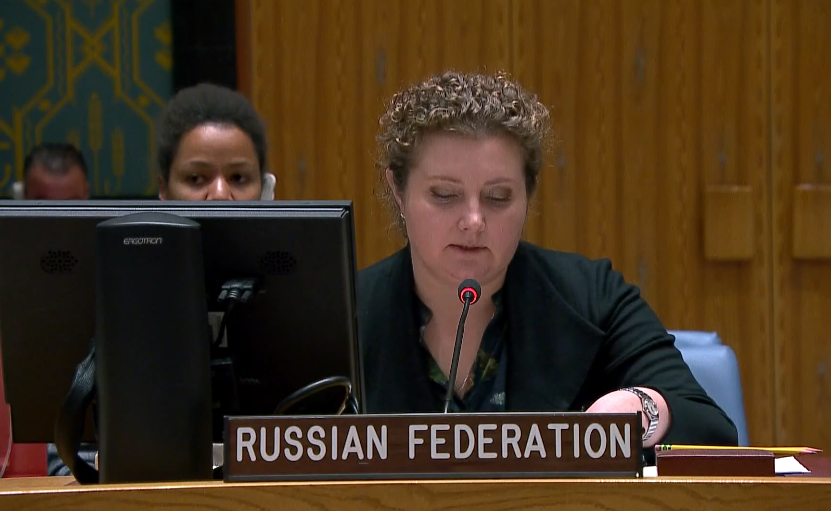Statement by Deputy Permanent Representative Anna Evstigneeva at UNSC briefing on the UN peacekeeping operations (police commissioners)
Mr.President,
We thank USG Lacroix and Police Commissioners of the UN Mission in South Sudan and the UN Stabilization Mission in the DRC, Ms.Fossen and Mr.Beret, for their assessments. We closely followed the remarks by Ms.Birikorang.
In today’s peacekeeping missions, the police component plays an important role. Being an inalienable part of the UN peacekeeping operations, Blue Berets contribute to implementing the mandates of the missions that are defined by the specifics of deployment locations.
One of the tasks of the police component is the promotion of the reform of law enforcement institutions and enhancement of national potential of host countries. Quite often, peacekeeping operations are deployed in the countries where national law enforcement bodies have been weakened dramatically or are not present at all. In such cases, Blue Berets have to take over their functions. However we must be mindful that UN capabilities are not limitless, and the United Nations cannot substitute for the local police on a permanent basis. So it appears important that professionally trained and equipped UN police should share their expertise in an effective manner, train local personnel and help them arrange their working process. This will make it possible for the national security forces to fully take on maintenance of legal order and protection of civilians. In this context, the principle of national ownership is a prerequisite for success. We will hardly be able to speak of effectiveness of the international support if we see that years of missions’ deployment only have led to complete substitution of the efforts of national police authorities by UN personnel.
Another crucial task of police peacekeepers is protection of civilians from direct threats to security by means of patrolling, monitoring, and apprehending the peace-breakers. Such efforts, as well as the role of Blue Berets as a link not only between the population and peacekeepers, but also between the population and host governments build people’s confidence in power institutions, i.e. lay down the groundworks for national reconciliation and sustainable peace. Thereby constructive interaction with the host side and due account for its priorities is key. Another important aspect is effective interaction with the population and attention to their concerns, and sometimes clarification of peacekeepers’ mandate, which is needed to win people’s trust and avoid inflated or unrealistic expectations.
Depending on the ethnical, cultural, and religious specifics of the communes residing in the area of missions’ deployment, women-peacekeepers can play a special role in establishing contacts with the locals. At the same time, we are convinced that the focus should not be on quantitative benchmarks in terms of missions’ gender composition, but on the experience, professionalism, and competence of officers, as well as adherence to the principle of broad geographical representation, including in leadership positions.
Mr.President,
There is no doubt that effective fulfillment of all outstanding tasks that UN police contingents are faced with, especially given the increasingly difficult operating conditions, requires a proper level of provision with material, technical, and human resources. Missions need to improve planning and management, avoid unnecessary expenditures and duplication of efforts. In terms of these processes, it is essential that the UN Secretariat should take into account the opinions and recommendations of police-contributing countries. Attempts to promote outside concepts and initiatives that have not received support of all member states of the UNGA Special Committee on Peacekeeping Operations are counterproductive.
In this regard, we believe the Security Council should maintain a standing dialogue with troop contributors and the host countries on all aspects of peacekeepers’ activities, i.a. at the stage of mission planning and elaboration of mandate.
Engagement with regional organizations appears essential, i.a. at the UN police track. In this regard, we support the work of the UN Secretariat, and initiatives of many regional organizations, the African Union in the first place, aimed at boosting the level of training of police peacekeepers.
Russia also contributes to this common cause. The Center for Peacekeepers’ Training of the All-Russian Institute for Advanced Training in Domodedovo (functions under the Russian Ministry of Internal Affairs) offers UN-certified training courses for law enforcement officers from Russia and abroad. Over more than 20 years of its operation, the Center has provided training to more than 2,500 professional police officers. The courses are designed for law enforcement officers from developing states, including Africa, with a special focus on women-peacekeepers. The training pays particular attention to linguistic skills – with due account for the specifics of the host state. As a contributor of UN police contingents, Russia will keep enhancing its part in the UN peacekeeping police by assigning officers with relevant expertise (including women) to UN missions.
Female representatives of the Russian Ministry of Internal Affairs have proved their worth in the UN missions in Cyprus, South Sudan, the DR Congo, and Abyei. As we pointed out at the recent summit of chiefs of police authorities, Russia stands ready to further assist in development of police peacekeeping.
Thank you.
